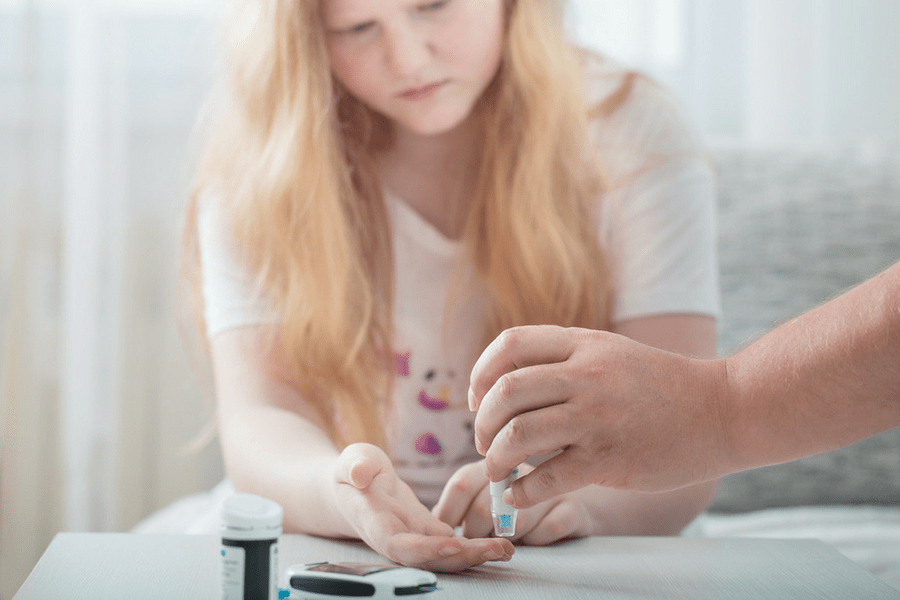Holistic T1D management: Addressing the emotional health of youth with type 1 diabetes

By Sam Moore, LSW
November is National Diabetes Awareness Month, a fitting time to discuss some difficult topics for those affected by type 1 diabetes (T1D).
As a social worker in a pediatric endocrinology office, I regularly work with children, teens, and their caregivers who are struggling to manage their diabetes and their lives. I often hear T1D is a difficult and scary disease to live with—both as a person with T1D and as a caregiver of a person with T1D. Whether it’s the constant fear of going low or the lingering dread of high blood-sugar levels, the never-ending daily routine or the challenging visits to the endocrinologist, T1D rarely provides my clients with a dose of positive, happy feelings.
Frequently, I meet with adolescents who find life with T1D too much for them to manage. Emotional health challenges negatively impact diabetes care and may require care from a trained professional. Research indicates that one-third of adolescents may have depression, anxiety, and/or disordered eating, and these adolescents are twice as likely to have poorly controlled diabetes1. Thus, it is extremely important that people suffering with moderate to severe emotional distress seek out assistance as soon as possible.
My role as a social worker allows me to talk with patients and families about these issues, assess what forms of support are currently available, and work with them to find access to professional services. What follows are some general recommendations for coping with T1D and ways to access assistance in more difficult times:
Peer Support
At times, the burden of diabetes and the feeling of isolation that it creates can be relieved by peer support. Unfortunately there are few ongoing opportunities for face-to-face peer support. However, JDRF chapters offer educational/support summits, Walks, and other opportunities to connect with others living with T1D throughout the year.
One great resource for children and adolescents with T1D is diabetes camp. There are several week-long summer camps in southeastern Pennsylvania that offer great financial aid and an awesome opportunity for young people with T1D to meet each other, have fun, and establish long-term relationships. Ask your endocrinologist for more information or search online for “diabetes camps near me.” Other forms of support may be found online utilizing blogs or social media.
The Teen Years
Peer support is often not enough, and at the intersection of emotional distress and chronic illness is usually stressed relationships with caregivers. Parents of teens, in particular, often have difficulty communicating and providing appropriate diabetes care in the best of times. Thus, a teen’s home may not be the best source of assistance. Sometimes, someone outside of the immediate family can provide the support and encouragement teens need to manage their emotional distress. Positive relationships with kind teachers, respected coaches, caring school counselors, trusted religious leaders, and extended family members can be the difference between barely holding on and thriving.
Professional Help
In some cases, even these relationships—no matter how beneficial—are still not enough. When emotional distress is severe enough, professional assistance is required. Scheduled, on-going, and regular encounters with a qualified therapist and, if needed, a psychiatrist are what I recommend to treat depression, anxiety, and disordered eating. Unfortunately, obtaining these services is not always an easy process. Finding treatment options usually starts with a call to the insurance company for in-network providers or by contacting someone like me, a social worker at an endocrinologist’s office. The social worker may be able to provide assistance or advice if there are barriers to accessing services (such as cost or transportation).
Knowing the Signs

In the most serious and scary of situations, starting care with a professional cannot wait until the next endocrinologist visit. If a parent or caregiver is concerned about their child, they should be looking and listening for statements about:
- Wanting to die or suicide,
- Feelings of hopelessness,
- Deep emotional pain,
- And self-harming behaviors such as cutting or burning.
Caregivers or parents should notice if their child has withdrawn more than usual, seems more anxious, angry, and or unexplainably sad. If so, it is important to ask—with directness and clarity—if the child is okay or if he or she has had thoughts of suicide. Caregivers and parents can share their own observations but should remember to listen with attentiveness and without judgment. The youth needs to know there is treatment available and that his or her caregiver or parent will get them the needed help.
Immediate Assistance
If a caregiver or parent believes the youth may need help right now, call the National Suicide Prevention Lifeline at 1-800-273-TALK (8255)2. Other options include taking your child to an emergency room or calling 9-1-1. These situations require action, comfort and warmth, and I encourage parents and caregivers to take their child’s emotional health seriously.
At St. Christopher’s Hospital, we routinely screen teens for emotional health with the hope of catching emotional distress early on so that support is provided prior to a crisis. I know that asking a child about suicide—or any kind of emotional stress—can be awkward and worrisome. However, I do so on an almost daily basis because I believe that getting support and help works—and it can make life with T1D less difficult and less scary.
___________________________________________________________________________________________________________________________

Sam Moore has lived in Philadelphia with his family for the past 12 years, after growing up on the plains of Oklahoma. He has worked in the Endocrinology and Diabetes department at St. Christopher’s Hospital for the past six years and is a 2009 graduate of the School of Social Policy and Practice at Penn.
